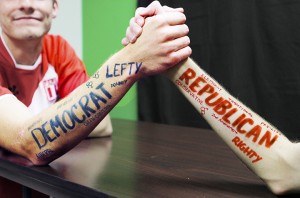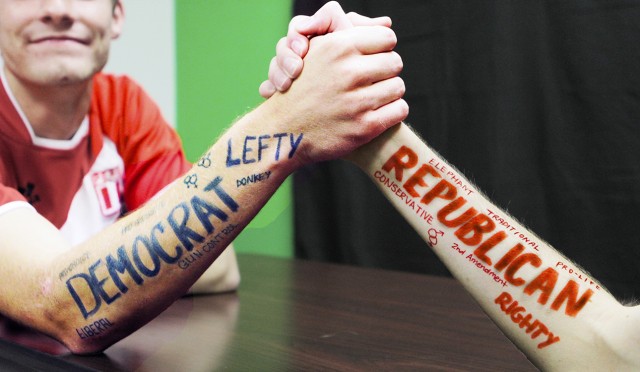
By Ashley Altus
Reporter
The different political views and ideologies that students are confronted with in college can cause a division among peers.
Fairfield junior Caleb Gunnels said he has seen a division of Baylor students who have only one ideology. He said views he does not agree with strengthen his personal beliefs, which becomes productive to learning.
“I’ve been criticized for being close-minded and not with it and too old school simply because I feel a moral obligation to believe certain things and support that moral obligation,” Gunnels said. “I don’t strive to be a prideful person, but I’m very proud of the beliefs I stand for.” Gunnels got his license to preach at Northside Baptist Church in Mexia. Although he grew up around conservatives, Gunnels said he chose on his own to be a conservative Republican because most of their ideologies and opinions reflect closely with Christianity.
“I feel more of an obligation to be conservative. I feel that a lot of democratic social policies violate bonds of Christianity and Christian morals,” Gunnels said.
Dr. Patrick Flavin, assistant professor of political science, said there are students who are prideful in their political views and some who are more soft-spoken and don’t talk about them at all.
“Those who are really committed, sometimes it can become perceived that when someone challenges their view, it almost becomes personal, which I don’t think is what we should be shooting here at Baylor,” Flavin said.
El Paso junior Andy Davila said he believes Baylor’s Baptist roots and geographic location in the South give the school a conservative stereotype.
However, Flavin said he has a good mix of different student beliefs in his classes.
“The popular perception is that Baylor students on average are more conservative than like UT Austin, but my experience has been that there is a good amount on both sides, which from my viewpoint of teaching a
class is a good thing,” Flavin said. “It’s better discussion in class whenever we talk about political issues.”
Flavin said studies show a nationwide trend that students become a bit more liberal and Democratic as they go through college. He is unsure whether or not the national standard exists at Baylor. Gunnels said he doesn’t think there are any political stigmas at Baylor.
“Democrats say Baylor is pushing too conservative, but strong conservatives look at Baylor and say it isn’t conservative enough,” Gunnels said.
Dallas senior Hayley Cumberland said students are either too passionate in their political views or say nothing because they are scared or uninformed.
This is especially apparent in her Politics and Communication class, she said.
“Some students are respectful, and others seem to hold politics and their ego on the same level,” Cumberland said.
She said some students can’t accept different political viewpoints without being personally offended.
Flavin said he tries to encourage his students to be passionate about their political views but to discuss them in a responsible, respectful manner.
Davila said he believes the majority of his peers are respectful of other people’s beliefs.
“You can tell a lot of the times by other people’s mannerisms or facial expressions with people who don’t agree with what is being said are judgmental,” Davila said. “People just tend to judge right away.”
Gunnels said he doesn’t see the views of the younger generation reflecting what Baylor’s view is.
“People with conservative views have been seen as bigots,” Gunnels said. “Any time you have a mindset or ideology that differs from the majority you’re treated as close-minded because you won’t conform to the views of society.”
He said students are more concerned with social acceptance rather than a moral obligation.
“Students have unsolidified views and there needs to be more participation in what they think personally matters and not what friends and society says is right or wrong,” Gunnels said.



